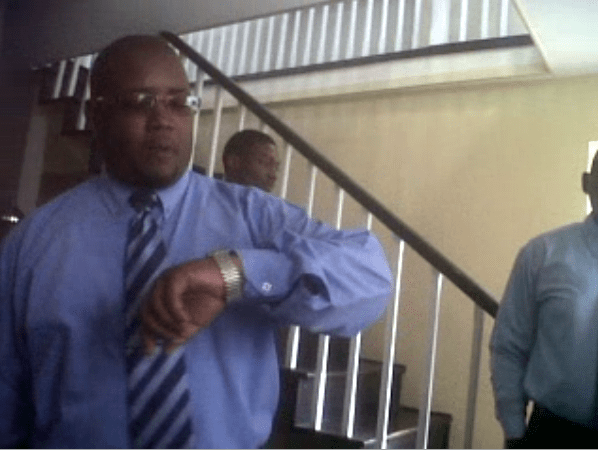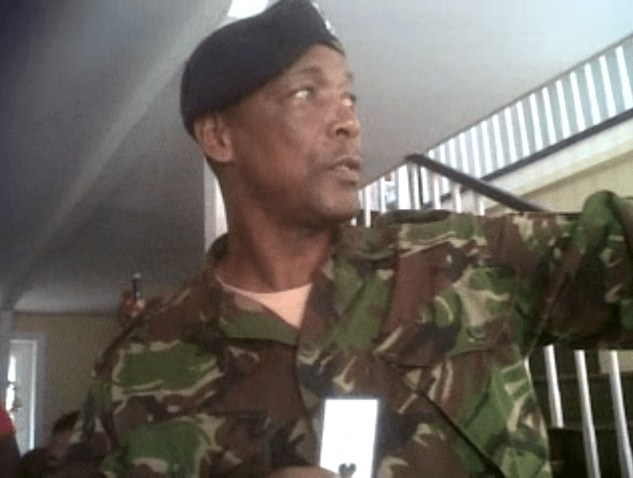
If the laws of St. Vincent and the Grenadines (SVG) are to be the guide, it appears that the arrest of opposition senator, Vynnette Frederick, last Thursday, was illegal.
Frederick was arrested and slapped with nine charges relating to false declarations, swearing falsely, and fabricating evidence, hours after a magistrate dismissed similar charges against her.
The arrest took place in the presence of at least four lawyers — two of whom were representing her — amidst their contentions that the police needed a warrant to do so.
A lawyer, who is not a member of Frederick’s legal team, told I-Witness News on Monday that his reading of the law suggests that the arrest “bordered on illegal”.
Another lawyer, who is also not a member of Frederick’s legal team and who also said the arrest seemed illegal, told I-Witness News that the lawyers could have been arrested as police threatened — albeit for “obstructing” the police during an “illegal arrest”.
During the one-hour standoff ahead of the arrest of Frederick, her lawyers, Barbadian Andrew Pilgrim, QC, and Trinidadian Keith Scotland, asked police to produce identification and a document showing they were authorised to arrest her.
“Where is your court document saying that she ought to be arrested?” Scotland asked an officer from the Criminal Investigation Department (CID), who was dressed in civilian wear and who identified himself as “Sergeant 23 Browne”.
The Sergeant, who became increasingly aggressive during the exchange, looked at his wristwatch, then said, “We have been here quite a long time. Almost an hour.”
The lawyers continued to ask for an arrest warrant and the police said they didn’t have one but again asked Frederick to go with them.
A uniformed officer from the Special Services Unit, who said he was Inspector Hazelwood, at one point produced what he said is was a police identification card, then explained that he was accompanying the sergeant in respect of “certain procedures” that the sergeant had spoken about.
However, as the lawyers pressed for details, the sergeant said, “Well if she is refusing and you are obstructing the police, we can arrest you.”
The lawyers responded that they were not obstructing.
“We are asking you to advise her properly…” the sergeant said, repeating his threat to arrest the lawyers.
An off camera female, which appears to be one of at least two other lawyers who were at the restaurant, told the police that advising Fredrick properly does not necessarily mean telling her to do what the police asked.
The inspector then explained that charges were being brought against Frederick in relation to perjury.
The lawyers said that the senator was acquitted of those charges, but the inspector told the lawyers that counsel didn’t know about the charges.

The lawyers then said that they could not advise Frederick if they did not know what she was being accused of.
The police responded by saying the lawyers can accompany them to the police station and advice her there, to which the lawyers responded that they could not advice their client to abdicate her rights.
The exchange was captured in a 20-minute video obtained by I-Witness News.
The video may offer some insights into police operations in this country.
More importantly, it brings into stark focus the seemingly disregard of some of the nation’s law enforcement officers for the laws that they swore to upkeep.
Powers of arrest
According to the Laws of St. Vincent and the Grenadines, any police officer may, without an order from a magistrate and without a warrant, arrest –
- Any person whom he suspects upon reasonable grounds of having committed an indictable offence;
- Any person who commits in his presence any offence punishably by imprisonment;
- Any person who obstructs a police officer while in the execution of duty, or who has escaped, or attempts to escape, from lawful custody;
- Any person in whose possession anything is found which may reasonably be suspected to be stolen property, or who may reasonably be suspected of committing, or having committed, an offence with reference to such a thing;
- Any person whom he suspects upon reasonably grounds of having been concerned in any act committed at any place out of St. Vincent and the Grenadines which, if committed in St. Vincent and the Grenadines would be punishable as an offence, and for which he is under the Fugitive Offence Act, or any other law relating to extradition and n force in St. Vincent and the Grenadines, or otherwise liable to be apprehended and detained in St. Vincent and the Grenadines;
- Any person whom he suspects upon reasonable grounds of having in his possession, without lawful excuse, any implement of housebreaking;
- Any person for whom he reasonably believes a warrant of arrest has been issued by a court of competent jurisdiction in St. Vincent and the Grenadines.
Other concerns
And some citizens have expressed concern about the attitude of the police towards Frederick, separate and apart from the fact that they failed to produce a warrant.
They have speculated about the attitude of police when dealing with “ordinary citizens” in the absence of legal counsel.
One lawyer told I-Witness News that the police could have asked Frederick to come to police station to be “processed” on Friday morning ahead of the court appearance that day.
The lawyer said that similar courtesies are extended to “ordinary citizens” who are charged with certain crimes and are not deemed a flight risk.
The lawyer noted that Frederick is not only a lawyer but also a Member of Parliament and should have been offered certain courtesies.
Police inconsistency
The treatment of the opposition lawmaker stands in stark contrast to the attitude of the police when one of their own was earlier this year accused of sexually assaulting his 8-year-old daughter and infecting her with a sexually transmitted disease.

The officer left the country while the police were investigating.
Commissioner of Police, Keith Miller, told I-Witness News in February that investigators wanted to tie up lose ends before making an arrest, but the officer got wind of the investigation and fled the country.
Further, the Office of the Director of Public Prosecution (DPP) earlier this year threatened to take legal action against the police high command over their tardiness in charging three of their colleagues in connection with a “friendly fire” incident in December, as the DPP had instructed.
In 2010, the police also released from custody one of their colleagues who was later charged with murder of another colleague.
The cop was released even after they had read a newspaper report about the DPP’s intention to bring the charge.
The police released the cop without consulting with the DPP but later arrested and charged him.






Is this an NDP sponsored page? Or is the writer an ndp supporter? It seems to be speaking ahead of things and instigating against ULP. If the “bordered illegal” does not make it illegal. Let the police do what they doing before you start “wilding” up people.
I have to laugh with these jokers who call themselves lawyers…”bordering on illegal?” “seem illegal?”…in other words the arrest was legal.
This is a disturbing story.
This doesn’t look good at all it’s hard to not question the motives behind these incidences. I hate when law enforcement and the judiciary isn’t consistent. We can’t have a police force appear so zealous in executing there duties with certain matters and then nonchalant and unprofessional with their matters. Politics should never influence the police nor the courts. The sad truth is this appears to be happening to frequently in Svg and the region and the world is watching. It’s time for police officers be more mindful of the population they serve remember you are servants of the people. Your duty is a serious one and a very important one.
Read also this article which has been posted in news papers and with online news media Caribbean wide.
https://www.iwnsvg.com/2013/07/16/reject-st-vincents-gestapo-style-mongoose-gang/
SPARKS coming out of your mouth Delilah, remember the Tom Jones song
My, my, my Delilah
Why, why, why Delilah
So before they come to break down the door
Forgive me Delilah I just couldn’t understand the law
A sergeant and an inspector went to arrest a lawyer (senator)I think they were instructed to do so.They could of been charged for neglect of duty as far as I know.The question is who instructed the police to arrest the lady? Guys try to understand what’s happening in SVG.
Yeah, Teacherfang. I, too, was intrigued by the “bordering on illegal”. You just gotta love these lawyers! But then again, all things considered, it was the perfect situatio n for ‘wishy-washiness’.
After having glanced at the IWN headline that evening and before reading the article, I was expecting to read that the lawyer had committed an offence after the decision of the court that day.
Come on, Delilah Sparx, let us not shoot the messenger until there is real reason to do so. The journalist’s duty is to report what is relative to matter at hand. Don’t be too worried about the welfare of ‘people’; they can handle it.
The police force is beginning to scare me. I noticed that there is now a new Acting Commissioner. Does he have any background in community policing or crime solution? I notice that for sure he has a strong paramilitary and personal security background. I wonder if this sort of background is most critical for the policing issues facing SVG? Things that make you go hmm…
The writing has been on the wall since this current government ignored all and abolished the Police And Criminal Evidence Act (PACE) a piece of legislation which was on the law books to regulate the behaviour of the police throughout the entire investigation process. If we, as a people, are not vigilant there will be worse to come. The entire Vincentian population, whether at home or abroad, needs to be watchful and prevent injustices from happening. It is right that we see the seeming injustice in the Trayvon Martin case but we must see what is brewing in our homeland, Saint Vincent and the Grenadines, and we must stop it from happening.
I do not think the matter was illegal. But I am sure it was well planned rehearsed to create publicity and cause the utmost embarrassment to the Ms Fredericks and the NDP. I believe it was a conspiracy between Minister, Police and Judiciary, I have no evidence of such, but that’s my belief and personal opinion.
I hope you people in the Diaspora are worried, because we are, we have to live the nightmare.
Peter Binose
Self-appointed keeper of the whistle